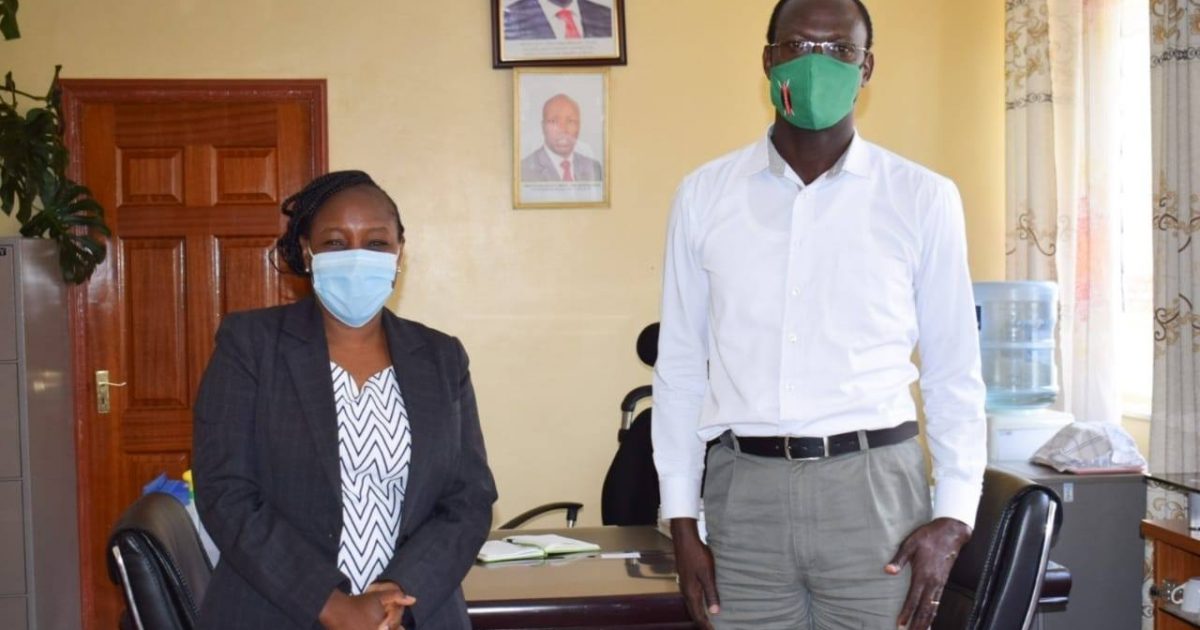The County Government of Nakuru has dispatched agriculture extension officers to train youthful horticultural farmers on the mandatory standards their produce is expected to meet in the European Union (EU) and other export markets.
County Executive Committee Member for Agriculture, Fisheries and Livestock Dr. Immaculate Maina observed that though a significant proportion of young farmers in the county were eyeing international markets, most were unaware of post-harvest treatment requirements and standards set by the EU and other marketing agencies.
While speaking after holding a meeting with Chief Executive Officer of Fresh Produce Consortium of Kenya Mr Okisegere Ojepat, the CEC said the over 200 farmers under the programme had been enlightened on pre-harvest interval which is the time between applying fertilizer and harvesting- that is supposed to allow fertilizer to disintegrate to ensure low residual levels.
“We are working to promote compliance with applicable laws and regulations among farmers through training to help them acquire the necessary requirements to tap into the export market,” she said.
The agricultural extension officers have been talking to farmers on the appropriate methods to use in order to contain the presence of quarantined pests and diseases in their produce and protect our European market,” stated Dr Maina.
She revealed that the Department of Agriculture was also working on Nakuru County Food Safety Policy and Agri-nutrition policies to intensify safe production, consumption and marketing of foodstuffs.
She said the County administration was also strengthening the capacity of various value chain actors in the horticultural sector to comply with food safety and export regulations.
Dr Maina observed that in June this year, Kenya’s horticultural produce valued at billions of shillings was intercepted at international markets following the presence of the False Codling Moth (FCM), which is a quarantine pest in Europe.
She said the farmers had been trained on how to identify and control FCM which usually afflict cut flowers and capsicum.
Other pests that attack horticultural produce, locking it out of the export market, include white flies, thrips, leaf-miners, mites and caterpillars, which attack all crops and fruit flies which mainly infest mangoes and oranges.
“Phytosanitary diseases and pests pose a great challenge for Kenya since some of the agrochemicals recommended for their control are banned in the European Union (EU). Their use will lead to high levels of residues in the crops, which could lead to a ban on the exports,” observed the CEC.
Speaking separately to Kenya News Agency, Director to the Agriculture and Food Authority’s (AFA) Directorate of Horticultural Crops Mr Benjamin Tito stated that at the peak of Covid-19 pandemic in May, Kenya received 17 notifications from its global market over presence of harmful pests and pesticide residues in its horticultural exports, up from four notifications that were recorded in March. The worst hit produce were rose flowers and capsicum.
“A multiagency team has been working with all stakeholders in the horticultural sector to put in place measures that will check the spread of regulated pests and use of pesticides banned in the European Union and other markets. Our efforts are paying off dividends as in August we received only one notification,” he explained.
In 2014 the EU gave Kenya an ultimatum to ensure all produce meant for the market should not contain more than two percent of chemicals or herbicide sprayed on the crop.
Ojepat warned that Kenya could lose up to 40 per cent of its market if corrective measures were not taken.
“We fear that we are going to lose the market advantage that we have in Europe if we do not address the issue of these pests in our exports,” said Fresh Produce Consortium of Kenya Chief Executive Officer.
“As we wait for our products to be cleared, other countries that have complied with the requirements will have their commodities in the shelves way ahead of us and this is how our crucial market will be weakened,” he said.
Ojepat said other measures that farmers angling for the export market must observe included not contaminating water sources, keeping records, avoiding environmental pollution through use of dangerous chemicals, having produce traceability measures and minding the welfare and conditions of employees.
“Any produce found to be non-compliant or contravenes the standard rules is denied entry into the target export market, shipped back at the farmer’s cost or destroyed,” stated the Chief Executive Officer.
He advised farmers to ensure that produce destined for export market is not wilted, has no soil or dirt residues, is free of chemical traces and is clearly labeled.
By Anne Mwale





